

A city-run Nectar’s – why not?
Note: posts by individual GMDSA members do not necessarily reflect the views of the broader membership or of its leadership and should not be regarded as official statements by the chapter.
After reading that Burlington’s legendary music spot Nectar’s had permanently closed, GMDSA Secretary David Wilcox wrote to Seven Days to propose municipalizing the venue. His letter, printed on 8/20/2025, is republished below.
In response to the shutdown of Nectar’s, I’d like to suggest a solution: Why not have the city government take over and run Nectar’s? There’s nothing radical or unprecedented about the City of Burlington running a popular music venue, given that it owned and operated 242 Main for 30 years. And I would argue that a venue like Nectar’s, one that’s synonymous with the general idea of what Burlington is, contributes far more to the city’s bottom line than its own financial numbers would indicate.
Without venues like Nectar’s, Burlington loses its aura as a cool, desirable place to live. And if Nectar’s has seemed like a shadow of its former self in recent years, why not try to revitalize it under new (public) ownership? Especially since the final shutdown of Nectar’s was due to a dispute with a landlord. The city has already forced the sale of one Handy property (184 Church Street) for the greater good of the community. Surely, there’s a way to make all this happen with enough political will.
I, for one, am sick and tired of passively accepting the loss of important places and services due to “the market,” which is every bit as much a human-created institution as laws and governments. The Burlington renaissance began with then-mayor Bernie Sanders (whose administration founded 242 Main) refusing to accept the market dictating that we couldn’t have nice things. If we want Burlington’s glory days to return, we need to rediscover that energy.
David Wilcox
Winooski


Milwaukee DSA chapter denounces police leader’s call for National Guard presence
The Milwaukee Democratic Socialists of America (DSA) denounce Milwaukee Police Association president Alex Ayala’s comments calling for a National Guard presence in Milwaukee, noting that such an escalation would harm communities across the city.
“If enacted, the deployment of military violence on the streets of Milwaukee will only cause harm to the citizens,” said Pamela Westphal, Milwaukee DSA co-chair. “Now, more than ever, the citizens of Milwaukee need to build solidarity with their neighbors as the increase of police and military violence grows every day.”
Ayala’s comments come after President Donald Trump deployed the National Guard against protestors in Los Angeles and against the people of Washington D.C., and he has suggested doing likewise in other U.S. cities, as near to Milwaukee as Chicago.
“We must remain strong together in every city facing militarization,” Milwaukee DSA co-chair Andy Barbour said. “We oppose this proposed violation of the safety of our community and are committed to the fight against fascism.”
DSA organizers intend to work with other organizations and community members across the city and beyond to keep our communities safe from increased militarization in Milwaukee.
As part of that work, the organization is calling on city leaders to follow the likes of Alderman Alex Brower and Alderwoman Larresa Taylor, who released a statement Thursday breaking down both legally and logically why a Milwaukee National Guard deployment would spell disaster for people here.
“We need our local government to advocate on behalf of the communities fearing for their lives here in Milwaukee,” Barbour said. “Working people will notice which of their representatives leave them in danger by remaining silent.”
Milwaukee DSA is Milwaukee’s largest socialist organization fighting for a democratic economy, a just society, and a sustainable environment. Join today at dsausa.org/join.


In Defense of the Student Movement
by Reese A
This piece was written 08/15/25
Last week, I had the honor of representing the Liberal Arts and Science Academy chapter of the Young Democratic Socialists of America (YDSA), at YDSA’s 2025 annual national convention. It was a true honor to be their co-chair, and to serve them once more as their delegate.
Ultimately, however, I came away from the convention concerned for our political future as a movement: We were decisively against organizing students. We failed to pass crucial resolutions that would strengthen the student movement, including R23: Building Campus Consciousness, Democracy, and Militancy through Student Unions and R10: Building an International Student Movement. R23 would have provided crucial support to mass student organizing in the form of student unions, a formation that can mobilize large numbers of students in solidarity in a way that YDSA cannot. The success of the student union formation is outlined below with Students United by LASA YDSA, and I think that failing to bet on mass student organizing via student unions will remain one of the biggest lost opportunities of the convention. Additionally, R10 centered our internationalism around building relationships with student organizations as YDSA, something that must be centered in order to build an international coalition to win student demands and ultimately socialism.
Instead, we focused on gatekeeping durable socialist organizing to only people with “real” ties to the class struggle (current laborers) and building value-pure socialist groups to recruit students into. We passed resolutions like R12: For a Campaigning Internationalism and R18: Recommitting to Running Strategic Campaigns as Unapologetic Socialists, which aren’t obviously bad, but show a clear focus away from larger mass movement organizing of students towards socialist groups. This tendency fundamentally doesn’t believe that students have a claim to power, but rather we must take a backseat to the “real” working class and focus on political education, supporting their cause, and running smaller campaigns as socialists to pressure the campus. It doesn’t believe in the mass student movement or their own claim to power and representation.
This is a mistake. If we want to win material change, at our schools and in the world, we have to be comfortable organizing the people around us, having conversations, and building power. As students, we represent some of the most diverse, progressive and willing bodies of people in America, and our organizations should strive to organize and mobilize as many students as possible to win. Some might argue that students don’t have the correct “class character,” and I must disagree. We are forgetting what the root of working class is – people who are not owners, people who do not control capital. Just as unemployed people are part of the working class, so are students. Additionally, others argue that students inherently aren’t worth organizing because they’re a transient group. The student movement has built some of the strongest organizations and movements in American history, from Vietnam and Students for a Democratic Society, to divestment from South Africa and winning the collapse of apartheid, to fighting for a free Palestine today. Turnover is not a valid reason to avoid organizing – if that were true, we wouldn’t be organizing Starbucks and Amazon. Yet regardless of the excuses people give for abandoning students, none of them give a valid reason to leave them unorganized and retreat to our comfort zone of like-minded socialists. They’re progressive, willing to fight, and have organized throughout history. It would be a shame for YDSA to give up on student mass organizing, let alone for the wider socialist movement to do so, yet increasingly that seems to be the trend.
It’s important that we organize the entirety of the working class by building durable organizations to fight for change, not because that we think only the working class can win socialism, but because we truly believe in each and every one of our neighbors as people. In this time of rising fascism, believing in people is more important now than ever if we want to defeat it. Yet the socialist movement seems to be retreating into hiding, requiring that people come to our doorstep instead of organizing our neighbors en masse for change, because we no longer find hope in them. We vote down student organizing, we vote down protest organizing, we stop committing to the rank-and-file strategy and make connections with the union leaders instead. This is what fascism wants of us: to feel hopeless and that your neighbor is untrustworthy, to build division in order to cement the ruling class. Instead, we must meet neighbors where they are, with organizations that can represent them both to their schools and to the wider world, and build committed comrades out of this bond.
At LASA YDSA, we organized a student union, Students United, to serve as a durable student bargaining representative to fight for fairer learning conditions and mental health support. We currently have over 8% of the student body supporting our bid to unionize by signing Union Authorization Cards. This union attracted a wide range of people because it was rooted in a collective movement, representation, and demands for change – a movement from which we were able to build committed socialist organizers out of. While YDSA could never legitimately claim to be a representative of students and demand bargaining rights, a union could, because a union’s legitimacy comes exclusively from its status as a representative of the students instead of ideology or self-interest. YDSA can lead the movement, YDSA can build organizers from the movement, but YDSA must commit to empowering the working class to seize power for themselves. This is an important distinction because it’s both an optical, political and communal one – it’s the difference between one-party rule and a worker’s state for the people. Democratic socialists should commit to people power and democracy first and foremost, not try to make a utopian socialist society concocted out of thin air and imposed on the people.
We will not win by building a cadre vanguard that people do not feel a connection to. We will not win by treating our neighbors as peasants to be strung along. We will win through class struggle and a mass movement of each and every one of us, that, through solidarity, can be built in any community and especially within students. We must not give up on student and wider working class solidarity. We must not give up on our own communities. We must commit more, organize for power, and organize to win socialism.
The post In Defense of the Student Movement first appeared on Red Fault.


Endorsement: Twin Cities Slate
DSA is proud to endorse the following candidates running with Twin Cities DSA support:

Robin Wonsley is running for her third term on Minneapolis City Council, representing Ward 2. She’s running as an independent socialist, and has been a tireless advocate for rent control, public housing, and police accountability.
Robin has a thorough list of campaign priorities which also references the work she has already done on council, encompassing an impressive legislative record. These priorities cover a wide range of issues impacting workers and students including a traffic calming program, housing programs, and working to secure tuition-free college at the state level.
Learn more about Robin in her interview with the Minneapolis Interview Project!

Soren Stevenson is running for Minneapolis City Council, Ward 8. He’s championing working class issues, including housing for all, public safety reform, and environmental justice.
Soren is a proud union member, survivor of Minneapolis police violence, and has extensive experience in housing justice. He recently worked within his union to prevent the permanent closure of a much needed homeless shelter, which required council support.
When Soren ran for council in 2023, he received the most first-choice votes by lost by a mere 38 votes! With just a little bit more help this time around we can secure his seat on Minneapolis City Council!
Robin and Soren are no strangers to national DSA endorsement and we’re looking forward to welcoming both of them to the new Socialist Cash Takes Out Capitalist Trash slate this year!

Adam Schneider is running on a third party ballot line for the Minneapolis Park Board. He has led environmental justice fights, including the Roof Depot campaign. His campaign is championing parks equity, youth programming, and labor protections.
I am running because I believe the Minneapolis Park & Recreation Board can be a vehicle to advance climate and environmental justice. By working with the community, our park system can be an integral part of an equitable, resilient, and vibrant Minneapolis.
– Adam Schneider
Adam’s focus areas for the Parks Board include community-driven governance to prioritize resident needs and health over developer interests, expanding community gardens and the urban tree canopy, and environmental stewardship.

Michael Wilson is also running for Minneapolis Park Board! Michael is a stalwart labor advocate, backed by unions running to unseat anti-union incumbents. He’s a former Park Board worker, labor organizer, and environmental justice leader in the successful Roof Depot campaign.
Michael is running on a platform of fair wages for park workers, expanding public transit to reach all parks, utilizing Park and Recreation programs to support working families, and directly addressing environmental concerns impacting the working class such as the Emerald Ash Borer infestation.
Michael’s going up against major anti-labor opponents who’ll pour in as much corporate cash as they need to keep him out of office – pitch in with a donation to our slate today!
The Twin Cities DSA Slate is part of the Socialist Cash Takes Out Capitalist Trash fundraising campaign!


That Trick Doesn’t Work Anymore: How DSA and Allies Defeated a Smear Campaign and Protected Free Speech on Palestine
By Jesse D. and Laura W.
Back in May of this year, DSA member and elected Beaverton School Board Director Dr. Tammy Carpenter was accused by the Board of antisemitism for her social media posts condemning Israel’s genocide of Palestinians in Gaza. The community rose up in defense of free speech and a free Palestine, and in August the board voted unanimously that she had not violated any board policy – demonstrating that these kinds of disingenuous smears are no match for the power of a revitalized anti-war movement.
The crisis started on May 29 when the Beaverton School Board held a special session for the sole purpose of disciplining Dr. Carpenter, who was not informed before the session began. The general public had no window into this proceeding as the live stream was blank for well over an hour, until the board appeared. Board meetings are typically held in person.
The accusation happened quickly and with no explanation: School Board Chair Dr. Karen Pérez-Da Silva entertained a motion to refer charges against Dr. Carpenter to a third party investigator. Director Susan Greenberg made the motion and it was seconded by Director Justice Rajee. The motion carried with five in favor and two opposed, and the meeting was immediately adjourned. Because the Board had met for the previous hour in a closed-door session, little information was available as to why Dr. Carpenter was under investigation. What were these charges? Why was Dr. Carpenter being targeted by a majority of the board?
When Portland DSA members learned about the investigation, we instantly understood it as not just an attack on Dr. Carpenter personally, but also as part of a broader strategy by local Zionist agitators to suppress pro-Palestinian sentiment by punishing public officials who dare to challenge the pro-Israel hegemony. We sprang into action to mobilize Dr. Carpenter’s many supporters, uniting our Washington County Branch, Labor Working Group, Electoral Working Group, Palestine Solidarity Working Group, and our network of educators.
We submitted public records requests to BSD in order to see for ourselves what complaints had been made against Dr. Carpenter. What we discovered was an astroturfed campaign led by the Jewish Federation of Portland to retaliate against Dr. Carpenter for using her personal platform to highlight the injustice and horror of the genocide in Gaza. One Instagram story – which recognized the 77th anniversary of the Nakba – was cited repeatedly in the 13 complaints submitted to the Board.
As a physician, Dr. Carpenter has been deeply affected by Israel’s targeted bombing of hospitals in Gaza. Her first social media post about the genocide was on October 17, 2023, when Israel bombed the first of many hospitals. This was the first of dozens of posts she has made on the subject since October 7, 2023, many of which also talked about the destruction of the schools and universities; a subject relevant to a school board member.
The next regular School Board meeting was scheduled for June 2, just four days after the investigation was voted on. Portland DSA members quickly planned a solidarity protest for that day. Over the course of the next 90 hours, we held planning meetings, arranged for speakers, promoted the protest on social media, talked to our coworkers and allies in the Beaverton School District, and contacted local elected officials. On the day of the Board meeting, 150 people turned out to rally and occupy the School Board headquarters, demonstrating the overwhelming local support for Dr. Carpenter and the struggle for Palestinian liberation. Attendees heard from Portland Jewish Voice for Peace organizer Julia Ford; State Representative Farrah Chaichi; and Hailey DeMarre, a DSA member, Beaverton Education Association activist and Beaverton High School teacher who had a pro-Palestinian mural in her classroom painted over. Beaverton City Councilor Nadia Hasan, the first Muslim person to serve on the Council, also spoke in solidarity during the School Board meeting public comment period. They all made it clear that the retaliation against Dr. Carpenter was just one example out of many in which the interests of Palestinian, Arab and Muslim students were utterly disrespected.

Following the rally, most supporters filed into the meeting room which quickly reached capacity – many supporters were turned away for fire safety reasons. The pro-Zionists were outnumbered 15:1. Those 20 or so counter-protesters carried signs saying “Tammy Sucks” and signs that equated solidarity with Palestine as a call for Jewish extermination. The vast majority of the room was taken up by anti-Zionist advocates and Dr. Carpenter’s supporters, holding signs saying “Stop Arming Israel” and “Free Speech on Palestine.”
The meeting was tense even before public comment began, as the audience seating was overflowing with people holding signs. At one point, a group of high schoolers were awarded honors by the district, and we overheard one student insist on staying to watch the anticipated drama of the meeting, saying, “No, Mom, I want to see how this goes!”
Following the awards, a heated public comment period began wherein both sides shared alternative perspectives on the situation the Board had caused by capitulating to the complaints engineered by the Jewish Federation of Portland. (To hear the speeches, you can watch this YouTube livestream.) Some speakers complained that their federal tax dollars are being used to fund the genocide, and their local tax dollars shouldn’t go to investigating board members with a pro-Palestine position. Although the Board chairperson interrupted several times to tell attendees to quiet their reactions, the event was entirely peaceful. The crowd dispersed with the feeling of a job well done. Following the meeting, public statements poured into the School Board expressing support for Dr. Carpenter and condemnation of the School Board’s actions.
On August 9, the results of the investigation were finalized and published: the third-party investigator determined the charges against Dr. Carpenter were unfounded. We were confident from the start that this would be the result, but Portland DSA was committed to making it clear – to the Beaverton School Board and any other power-players considering following the lead of the Zionist lobby – that the public is in opposition to both the genocide and the erosion of free speech rights.
We see these charges in the same light we have seen charges of anti-semitism made against other socialist figures who have championed Palestinian liberation, like Zohran Mamdani in NYC or Rep. Rashida Tlaib in Congress. The Zionist lobby has long relied on slander to defend military funding for Israel, but it’s clear this trick doesn’t work anymore. Opposition to the imperialist war machine and solidarity with Palestine is not a liability – it is our strength.
We encourage all sympathizers to join Portland DSA and be a part of the movement to end war and genocide and instead create a world where all people can live in peace. From Beaverton to Palestine, all children should have safe, well-resourced schools that facilitate free inquiry. This will not be the last time our public figures are attacked for championing that vision, but no matter what comes next, we’re ready to keep fighting.
The post That Trick Doesn’t Work Anymore: How DSA and Allies Defeated a Smear Campaign and Protected Free Speech on Palestine appeared first on Portland DSA.


Madison Area DSA Stands in Solidarity with the Social Justice Center and with our Homeless Neighbors!
As part of a city-wide crackdown on our homeless neighbors, the City of Madison is unfairly targeting the Social Justice Center, demanding that the SJC removes its food pantry, public health vending machine, benches, and public art, in an attempt to drive away unhoused people who rely on the SJC and the organizations it houses for shelter, safety, healthcare, and support.
Madison Area Democratic Socialists of America recognizes the effort the Social Justice Center puts into addressing the housing crisis that this city ignores, and we stand with the SJC and all who rely on it.
There is no denying it: there is a crisis in Madison. Rents get higher and access to affordable housing gets more limited by the day, forcing more and more people from their homes. Public restrooms are not open early or late enough. Overcoming addiction is nearly impossible when one’s basic needs for survival are not met. Each of these problems is a rung in the ladder of capitalist oppression, which forces the working class into worse and worse conditions until they have nowhere left to go.
The city’s approach to this crisis is unjust and unhelpful. We cannot disappear the unhoused population. We must house them. We must give them safety, security, and support. They are our neighbors, community members, and constituents of the politicians who claim to represent us. Any one of us could be a layoff or medical emergency away from joining them. This crisis is a reminder to the rest of the working class that the ruling class will turn its back on anyone who isn’t making them profits.
The Beacon, Madison’s primary day shelter, is beyond capacity, so people look for shelter in other parts of the city. The city’s proposed new men’s shelter won’t be ready until next year, and will only have 250 beds – not nearly enough to meet the well-documented need.
But instead of fully funding and expanding the sorely needed homeless services and meaningfully addressing the housing crisis that makes them necessary, the city is cracking down on neighbors helping neighbors – by increasing police presence at and making punitive demands of the Social Justice Center, by threatening to close down the Dairy Drive campground with winter just around the corner, and by sweeping the encampment at the Wisconsin Veterans’ Museum.
“Solving” homelessness with incarceration is more expensive per person than harm reduction centers and housing first policies, and only perpetuates the cycle.
As community members, it is our responsibility to provide what the city will not, and the Social Justice Center aims to do exactly that. We also have to fight for a just future in which everyone has what they need. MADSA stands in solidarity with the Social Justice Center, and calls upon the Madison Common Council, Madison Mayor Satya Rhodes-Conway, and the Dane County Board to do right by our neighbors:
1. Stop targeting the SJC for stepping up where the city has failed.
2. Continue to fund the Dairy Drive campsite, a crucial transition program.
3. Support the Dane County Homeless Justice Initiative’s demands to fully fund homeless support services.
4. Cure the root cause of the homelessness crisis by building affordable, desirable, and dignified public housing where our neighbors can thrive, not just survive!


You Are a Revolutionary: A Letter to Working-Class Creatives

To my comrades in the arts,
I write to you today, hopeful that I can answer one of the most important questions of our time.
This question sits at the back of my mind, and no doubt, most likely yours. It festers and manifests into either hope or defeat.
It inspires many, but it also leaves us with feelings of conflict. This, combined with the constant attacks from those in power and those who have been brainwashed to believe they will someday join their oppressors on that blood-soaked throne, can even make us feel unworthy and like impostors to the cause.
The question I’m here to ask today, to you, myself, and our allies across the nation and around the world, is this: How, without taking up arms, can I truly call myself a revolutionary?
We watch as the vampiric class takes our pleas for a better society as at best a tantrum, and at worst, an attack on their so-called “free world.”
We watch as the left hand of the establishment monster pats us on the head and sends us on our way, then reaches over to the right to collect its share of the wealth and power. All the while, that same right hand just moments before, with a clenched fist, slammed down and snuffed out the cries of the working class.
It’s by acknowledging that these are the likely outcomes that many of us may be too afraid to march or speak out, with the fear that you can just be abducted, sent to a place you may not even know, or risk losing what little stability you have in an already broken, unjust, and unstable system.
And all this, again, begs the question: How, without risking what little I have, can I truly be a revolutionary?
And throughout countless hours of reflection, sleepless nights, and a painful analysis of the hate rampant on social media, it’s that I’ve recognized what can be one of the most revolutionary acts of our modern times.
And that, my friends, is to create.
For too long, they have told us that our lives as creatives are meaningless. That our pursuit of the arts and knowledge about everything that makes us human is not worth it because it is not profitable.
That to live a fulfilling life, you need to give yourself to a system that does as little as possible to ensure your wellbeing in the name of profit.
Sacrifice what little time you have to pursue your passions to make even more money, and to leave little energy in your reserve so as not to question or step out of line.
To that I say, be relentless in your rebellion.
And by that I mean we must execute the perversion that is this self-hatred and submission to capitalist degradation.
Creativity feeds the human spirit, consequently fueling the desire to learn, and as we’ve seen, education is what tyrants fear most.
Because it’s through education that we can make vital steps toward achieving solidarity and collective class consciousness.
So take everything going on around you
And write a poem,
Draw a picture,
Make a song,
Pen an essay,
Record a video,
Use the arts to fuel the revolution. To create the blueprint for a world that values people over profits.
And if you say to yourself you’re not an artist, I challenge you to prove yourself wrong.
And when you do, you will realize that you are a revolutionary.
The post You Are a Revolutionary: A Letter to Working-Class Creatives first appeared on Salt Lake DSA.


The Vermont Socialist - GMDSA newsletter (8/30/25): Storm the fort

Kids in Vermont have gone back to school. On their first day after the summer vacation, Windham County students may have expected to say hello again to their usual bus drivers, but that'll have to wait. Travel Kuz, the supervisory union's transportation contractor, has locked out members of Teamsters Local 597 and brought in scabs.
Bus drivers and monitors responded to their bosses' refusal to bargain by organizing pickets. On Wednesday, Travel Kuz sent them a cease-and-desist letter, calling a demonstration at Brattleboro Union High School "unlawful" and "unsafe." Local law enforcement disagreed.
The Teamsters want Windham Southeast superintendent Mark Speno to pressure Travel Kuz to end the lockout and have encouraged allies to contact him. Tell Speno (802-254-3730, mspeno@wsesdvt.org) to support the transportation workers' fight for fair wages and benefits. You can even attend the next school board meeting.
Follow Local 597's Facebook page for the latest updates. An injury to one is an injury to all.
And speaking of the Teamsters, you may see some of them in Burlington at the Labor Day Solidarity March, Rally & Picnic. Dozens of unions and activist organizations (including Green Mountain DSA) have endorsed the event.
You can help us get ready by joining us at Migrant Justice (179 S. Winooski Ave., Burlington) today (8/30) at 4 p.m. to create art for the rally. Feel free to bring materials.
We expect a massive turnout for the rally itself. Meet us at Battery Park at 1 p.m. on Monday, Sept 1. Labor Day belongs to workers.
Unfortunately, as the schoolkids already know, Labor Day also means that summer is over. Thanks for the memories – here are a few shots from our chapter's barbecue at Oakledge Park.
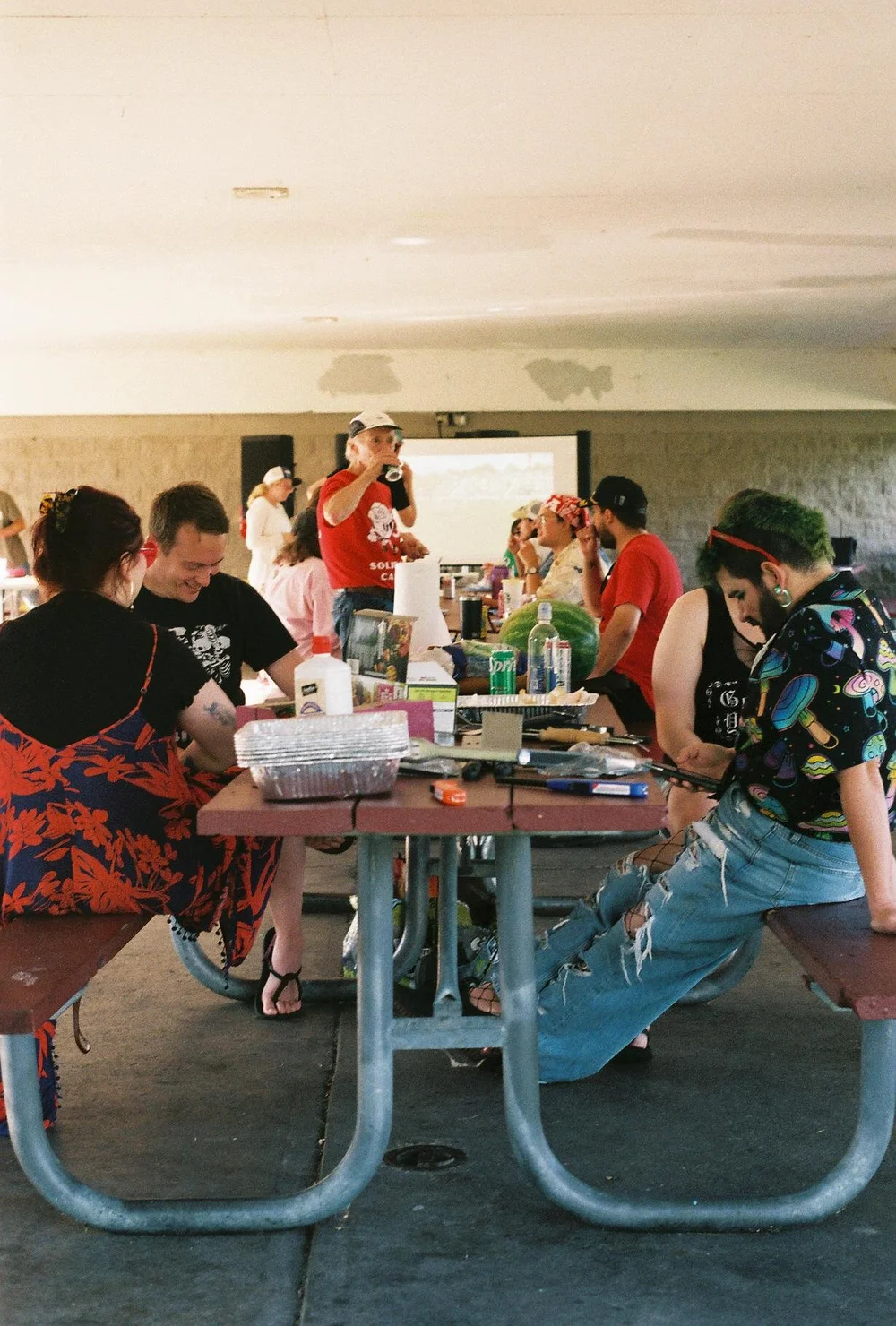
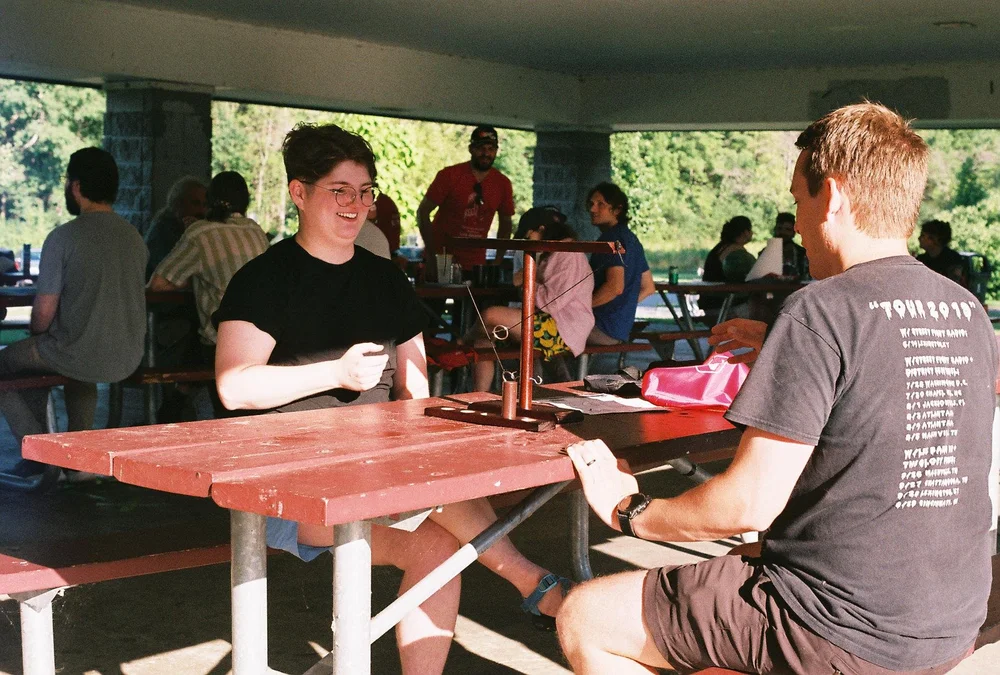
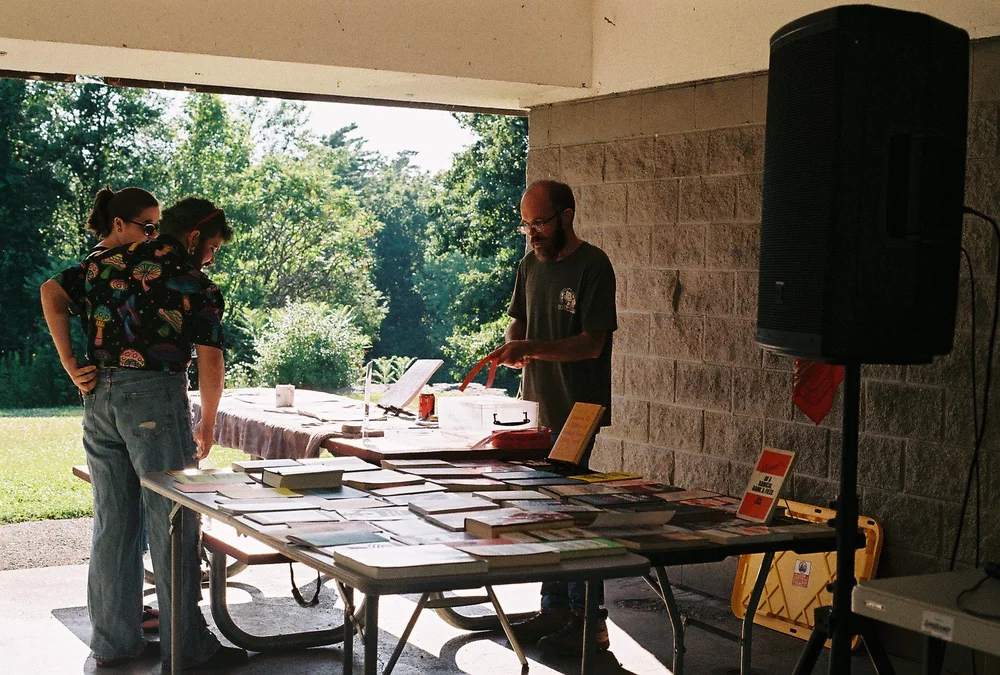
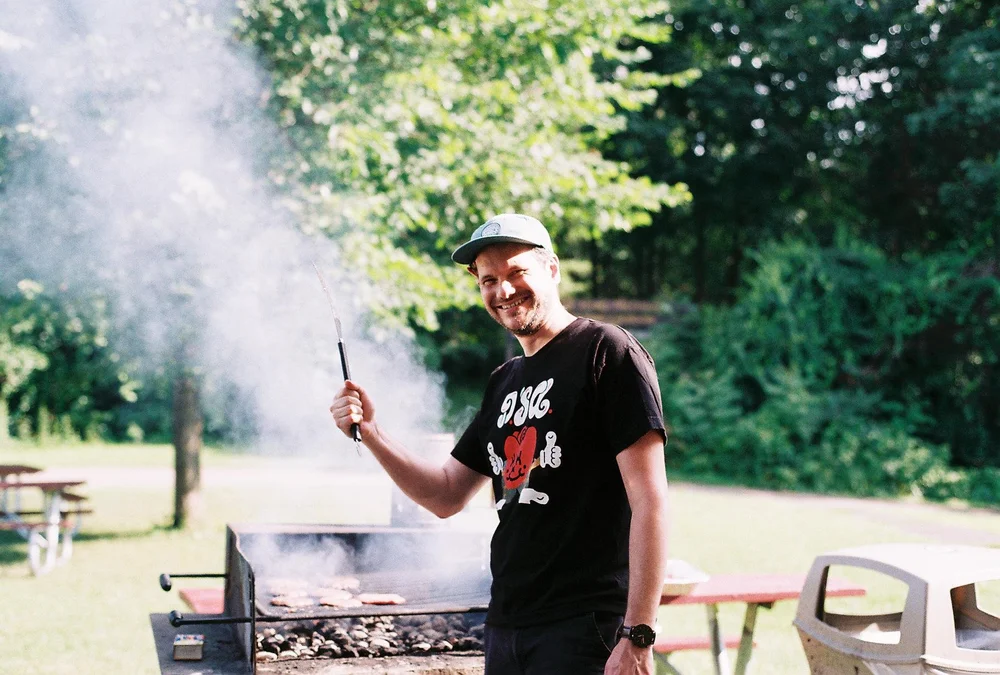
GMDSA MEETINGS & EVENTS
🚲 In order to avoid a conflict with the Labor Day rally, GMDSA's Urbanism Committee will meet on Tuesday, Sept. 2, at 6 p.m. on Zoom.
👋 Find out how you can help our Membership Committee improve recruitment and involvement in our chapter on Thursday, Sept. 4, and Tuesday, Sept. 23, at 6 p.m. on Zoom.
🧑🏭 Our Labor Committee will hold its next meeting on Monday, Sept. 8, at 6 p.m. on Zoom.
🔨 Talk about your job and learn about shop-floor organizing from peers at Workers' Circle (co-hosted by the Green Mountain IWW) on the second and fourth Wednesdays of each month, including Sept. 10, at 6 p.m. at Migrant Justice (179 S. Winooski Ave., Burlington).
🍿 Socialist Film Club will host another backyard screening in Burlington on Friday, Sept. 12, at 7 p.m. Please email us for more information if you're interested.
🗳️ The next meeting of our Electoral Committee will take place on Wednesday, Sept. 17, at 6 p.m. on Zoom.
🤝 GMDSA's East Branch and West Branch will come together for a general meeting on Saturday, Sept. 20, at 11 a.m. at Montpelier's Christ Episcopal Church (64 State St.), with an optional orientation for newcomers at 10 a.m.
🍉 Our Palestine Solidarity Committee will meet on Monday, Sept. 29, at 7 p.m. on Zoom.
STATE & LOCAL NEWS
📰 GMDSA-endorsed state senator Tanya Vyhovsky (Chittenden-Central) toured Ukraine, meeting with activists, politicians, students, and trade unionists.
📰 Protesting the Trump administration, Vermonters and Quebecois gathered at the US-Canada line in an expression of international solidarity.
COMMUNITY FLYERS
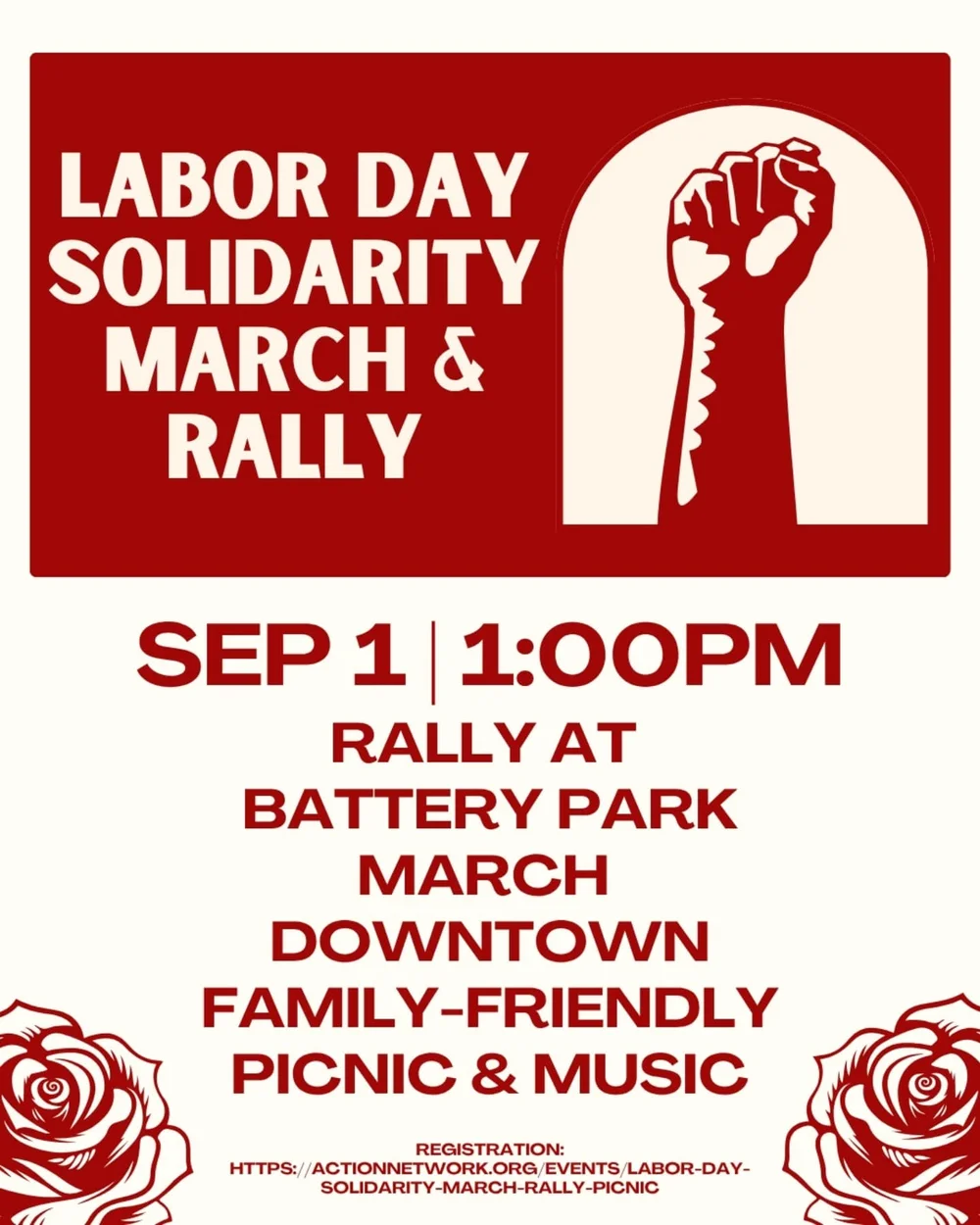
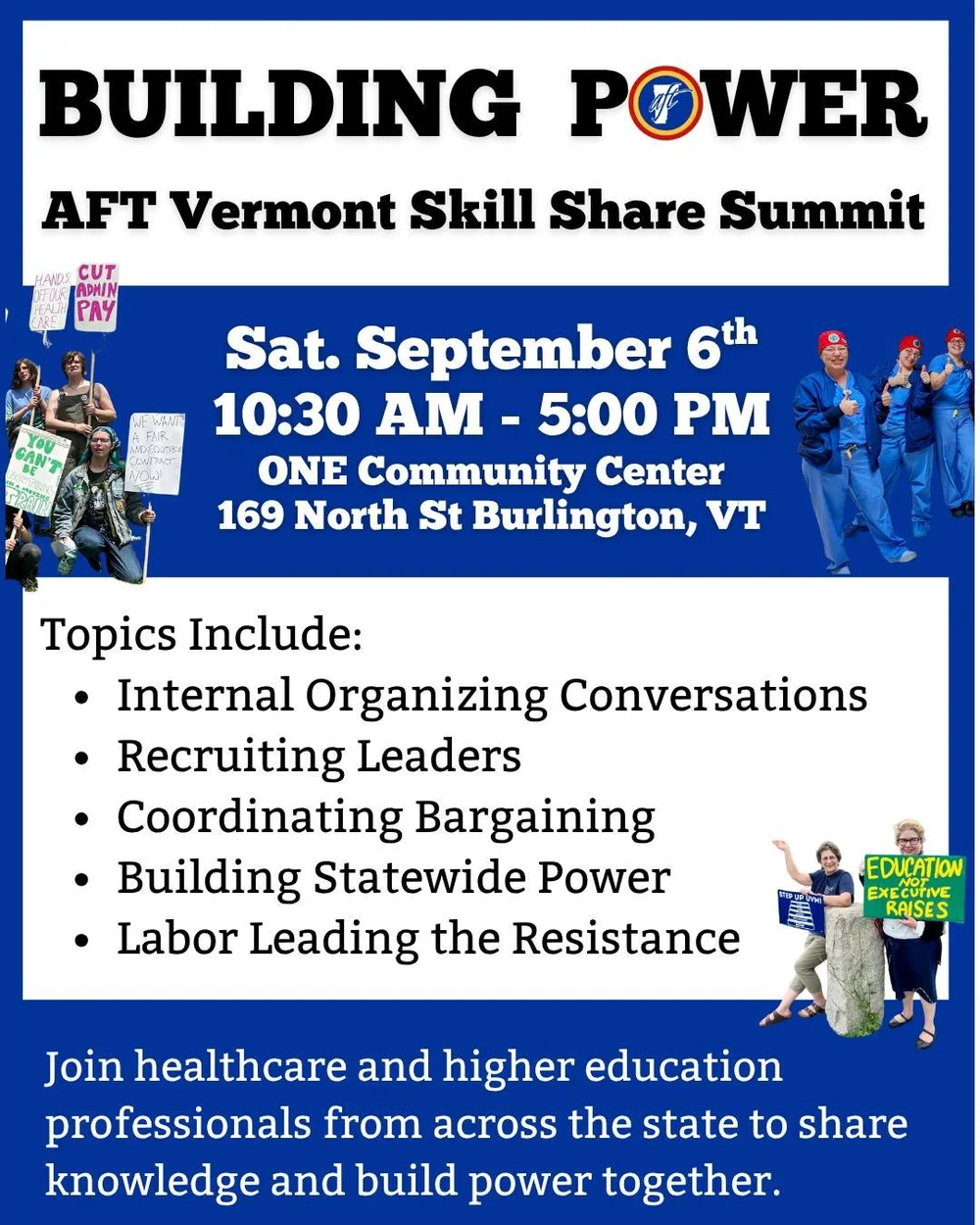

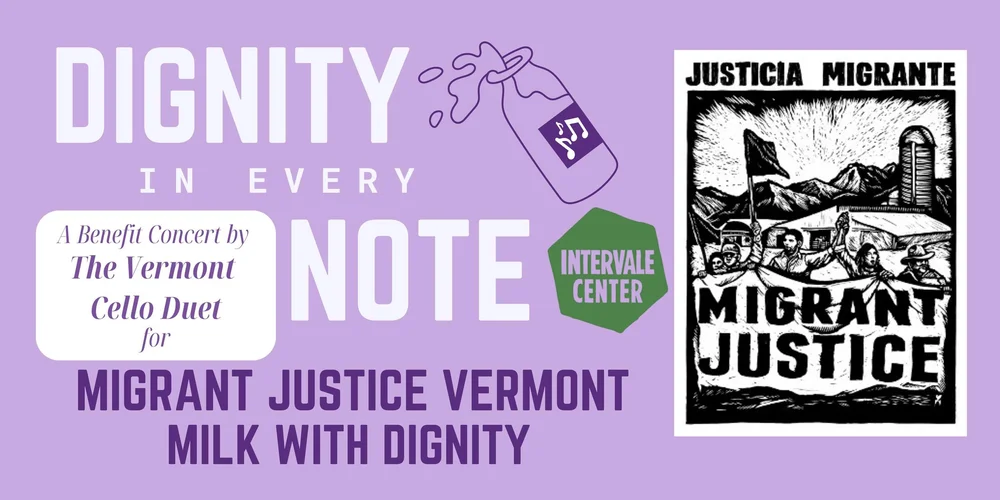


DSA IC Condemns US-brokered “peace” eroding Armenia’s sovereignty and rewarding Azerbaijan’s genocide in Artsakh
The Democratic Socialists of America International Committee (DSA IC) unequivocally condemns the “peace” plan brokered by President Donald Trump between Armenia and Azerbaijan. We call on the United States to immediately reverse course and ensure that any peace agreement is finalized with full consequences for Azerbaijan’s officials for perpetrating a genocide against the indigenous Armenians of Artsakh (also known as Nagorno-Karabakh). This means ensuring the right of return for Artsakh Armenians, recognition of their right to self-determination, and prosecution for crimes against humanity by Azerbaijan’s ethno-supremacist government under Ilham Aliyev.
Nearly two years ago, Azerbaijan finalized a brutal assault on the de facto autonomous region of Artsakh, besieging, starving, and ultimately expelling the native Armenian population. As the world first saw in 2020, this assault was made possible by U.S. complicity in the actions of two of its allies, Turkey and Israel. Despite State Department Acting Assistant Secretary Yuri Kim assuring the world that “the United States will not countenance any action or effort—short-term or long-term—to ethnically cleanse or commit other atrocities against the Armenian population of Nagorno-Karabakh,” the United States did exactly that.
Despite Azerbaijan’s documented and numerous crimes against humanity, its occupation of sovereign Armenian territory, and its genocide of Artsakh’s Armenian population, administrations of both major parties have now acquiesced to this regime’s demands. This includes repeatedly waving Section 907 of the Freedom Support Act to send American tax dollars to arm the Azerbaijani military. The shameful situation can be explained by the geopolitics of the South Caucasus.
Turkey, for its part, continues to engage in vehement denial of the 1915 Armenian Genocide and uses fascistic, hyper-nationalist rhetoric both at home and in its foreign policy. Towards Azerbaijan, this means advancing Pan-Turkism, which largely scapegoats Armenians as an inferior and sub-human people worthy of extermination in order to create a contiguous Turkic nation. Both Turkish President Reccep Erdogan and Azerbaijani President Aliyev have, for instance, publicly praised the actions of the perpetrators of the 1915 Armenian Genocide and their immediate underlings repeatedly advance the idea of “completing” the task. However, support for Azerbaijan from U.S. allies neither starts nor ends with Turkey.
Israel, since the fall of the Soviet Union, has cultivated a deep relationship with Azerbaijan. Reports suggest that Azerbaijan continues to be one of the top three energy suppliers of Israel. In exchange, Israel sells weapons to and tests developing systems in partnership with Azerbaijan’s military. In fact, around 70 percent of Azerbaijan’s weapons are reported to come from Israel. In 2020, Israeli drones were a key factor in Azerbaijan’s victory over Armenian forces protecting Artsakh. It is likely for this reason that Israel also proudly denies the Armenian Genocide even today. Furthermore, Israel views Azerbaijan as a key geostrategic asset to gain leverage, intelligence, and supremacy over Iran, with a number of Israeli bases being hosted close to the Iranian border.
The U.S.should not sacrifice Artsakh’s Armenians on an altar to these two genocidal allies. Assisting Azerbaijan in whitewashing genocide in exchange for oil to flow from Baku to Europe and Israel and to further Pan-Turkism is criminal. As socialists, we recognize that the dignity of any people should not be contingent on their value to global capital. Tragically, this peace plan does exactly the opposite: subjugating Armenia at the expense of profit, Pan-Turkism, and Zionism. The Armenians of Artsakh have been indigenous to the region for millennia, with some of the Armenian people’s earliest cultural heritage originating in the area. Their right to self-determination is inalienable and the right of return for the over 100,000 forcibly displaced people must be part of any U.S. brokered peace along with release of prisoners of war, political prisoners, and withdrawal from occupied lands.
This injustice is compounded by the provision for a 99-year, privatized lease on a transit corridor for Azerbaijan that would cut through the Armenian region of Syunik. Profiteering on a route that will likely be used by Turkey and Israel to supply weapons to Azerbaijan to use against Armenia or Iran. The creation of such a route also calls into question Armenian sovereignty, as the corridor would potentially cut off Armenia from its only friendly neighbor, Iran.
This would undeniably be an extension of American neo-colonial power into Armenia that, as history suggests for 99-year leases, any future Armenian government will find incredibly difficult to get out of. Troublingly, U.S. diplomatic history is checkered with interventions into smaller, less powerful countries to uphold such strategic trade routes and enrich private enterprises. This includes the Panama Canal in Panama, United Fruit in Guatemala, the overthrow of Iran’s democratically elected government, and the military takeover of Chile. This history must not be allowed to repeat itself in Armenia. Instead, the United States must go back to the table and reverse the genocide of Artsakh Armenians.
Democratic Socialists of America’s International Committee stands with oppressed people around the world fighting for liberation against imperialism, racism, and capitalism. From Palestine, to the Congo, to Sudan, to Armenia and Artsakh, and beyond, we recognize that these struggles are interconnected. In solidarity with comrades around the world, we strongly condemn this reprehensible proposal and call on the US government to change course.
Ամերիկայի Միացյալ Նահանգների Սոցիալիստ Դեմոկրատների Միջազգային Կոմիտեն (DSA IC) անկասկած դատապարտում է «խաղաղության» այն ծրագիրը, որ միջնորդեց նախագահ Դոնալդ Թրամփը Հայաստանի եւ Ատրպէյճանի միջեւ։ Մենք կոչումէնք անում Միացյալ Նահանգներին որ անմիջապես փոխել ընթացքը եւ ապահովել, որ խաղաղության որեւէ համաձայնագիր կնքուի միայն այն դէպքում, երբ Ատրպէյճանի պաշտօնյաները կ’ենթարկուին լիարժէք հետեւանքներու՝ Արցախի (նաեւ յայտնի իբրեւ Լեռնային Ղարաբաղ) բնիկ հայության դէմ իրականացրած ցեղասպանության համար։ Սա նշանակում է ապահովել արցախահայության վերադարձի իրաւունքը, նրանց ինքնորոշման իրաւունքի ճանաչումը, նաեւ Ատրպէյճանի էթնօ-գերազանցական վարչակարգի՝ Իլհամ Ալիեւի գլխաւորությամբ, մարդու դէմ ոճիրներու համար դատապարտումը։
Մօտ երկու տարի առաջ Ատրպէյճանը աւարտեց դաժան յարձակում Արցախի փաստացի ինքնավար շրջանի վրայ՝ պաշարելով, սովամահ անելով եւ ի վերջոյ արտաքսելով բնիկ հայ բնակչութիւնը։ Ինչպէս աշխարհը տեսաւ 2020 թուականին, այս հարձակումը հնարաւոր դարձաւ Միացյալ Նահանգներու մեղսակցությամբ՝ իր երկու դաշնակիցներու, Թուրքիոյ եւ Իսրայէլի գործողութիւններուն։ Չնայած Պետդեպարտամենտի Ժամանակաւոր Օգնական Արտգործնախարար Յուրի Քիմը վստահեցրեց աշխարհին, թէ «Միացյալ Նահանգները պիտի չհանդուրժեն որեւէ գործողութիւն կամ փորձ՝ կարճաժամկէտ թէ երկարաժամկէտ,՝ էթնիկ զտումներ կամ այլ ոճիրներ իրականացնելու համար արցախահայության դէմ», Միացյալ Նահանգները գործնականում ճիշդ այդ բանն արեցին։
Չնայած Ատրպէյճանի բազմաթիւ եւ փաստագրուած ոճիրներուն՝ մարդության դէմ, Հայաստանի ինքնիշխան տարածքներու գրաւումը եւ Արցախի հայության ցեղասպանութիւնը, երկու խոշոր կուսակցութիւններու վարչակազմերը զիջած են այս վարչակարգի պահանջներուն։ Սա ներառում է բազմիցս հրաժարվել Freedom Support Act Section 907-ի, որպէսզի ամերիկյան հարկատուներու գումարով զինեն Ատրպէյճանի բանակը։ Այս ամօթալի կացութիւնը բացատրելի է Հարաւային Կովկասի աշխարհաքաղաքականությամբ։
Թուրքիան, իր հերթին, կը շարունակէ մերժել 1915-ի Հայոց Ցեղասպանութիւնը եւ օկտագործում է ֆաշիստական, գերէթնիկ-ազգային հռետորաբանութիւն թե՛ ներքին, թե՛ արտաքին քաղաքականության մեջ։ Ատրպէյճանի հանդէպ, սա նշանակում է առաջ տանել Պանթուրքիզմը, որ հիմնականում հայութիւնը կը դարձնէ քաւության նոխազ՝ իբր անարժէք ու ենթամարդկային ժողովուրդ, որուն ոչնչացումն անհրաժեշտ է «միացյալ թուրանական ազգ» ստեղծելու համար։ Թուրքիայի նախագահ Ռէջեփ Էրդողանը եւ Ատրպէյճանի նախագահ Ալիեւը անգամ բազմիցս հրապարակավ գովեստներ յղած են 1915-ի ցեղասպանության իրագործողներուն, իսկ անոնց անմիջական հետեւորդները կրկին ու կրկին առաջ կտան գաղափարը «ավարտին հասցնելու»։ Սակայն Ատրպէյճանի հանդէպ ամերիկյան դաշնակիցներու աջակցութիւնը չի սահմանափակուիր միայն Թուրքիայով։
Իսրայէլը, Խորհրդային Միության անկումէն ի վեր, խորապէս զարգացուցած է խոր յարաբերութիւններ Ատրպէյճանի հետ։ Զեկոյցներու համաձայն, Ատրպէյճանը կմնա Իսրայէլի երեք խոշոր էներգամատակարարներէն մէկը։ Փոխարենը, Իսրայէլը զէնք վաճառում է եւ համատեղ համակարգեր կփորձարկէ Ատրպէյճանի բանակի հետ։ Իրականում, որ Ատրպէյճանի զէնքերու շուրջ 70 տոկոսը հասնում է Իսրայէլից։ 2020-ին, իսրայէլյան անօդաչուները վճռական դեր խաղացին Ատրպէյճանի յաղթանակին՝ Արցախի պաշտպանական ուժերուն դէմ։ Հաւանաբար այս պատճառով Իսրայէլը մինչեւ այսօր հպարտությամբ կժխտէ Հայոց Ցեղասպանութիւնը։ Աւելին, Իսրայէլը տեսնում է Ատրպէյճանը որպէս կարեւոր աշխարհագրական ռազմավարական ակտիվ՝ Իրանի դէմ լաւագոյն լծակներու, հետախուզական եւ ռազմական գերակայության համար՝ տեղադրելով բազում ռազմակայաններ Իրանի սահմանին մօտ։
Միացյալ Նահանգները պէտք չէ զոհաբերէ Արցախի հայութիւնը այս երկու ցեղասպան դաշնակիցներուն զոհասեղանին վրայ։ Աջակցիլ Ատրպէյճանին՝ ցեղասպանութիւնը սպիտակեցնելու համար՝ նավթը Բաքուէն դէպի Եւրոպա եւ Իսրայէլ հոսեցնելու եւ Պանթուրքիզմը առաջ տանելու նպատակով, հրէշաւոր ոճիր է։ Որպէս սոցիալիստներ, մենք ճանանչում ենք, որ որեւէ ժողովուրդի արժանապատուութիւնը չպէտք է կախուած լինի անոր արժէքէն համաշխարհային կապիտալի համար։ Ցաւօք, այս խաղաղության ծրագիրը ճիշդ հակառակնէ անոգմ՝ ենթարկելով Հայաստանն շահ շահոյթին, Պանթուրքիզմին եւ Սիոնիզմին։ Արցախի հայերը բնիկ են այս երկրամասին մէջ հազարամեակներով, ուր հայ ժողովուրդի ամենահին մշակութային ժառանգութիւններէն ոմանք ծագած են։ Անոնց ինքնորոշման իրաւունքը անօտարելի է, իսկ բռնագրաւուած 100,000 մարդոց վերադարձի իրաւունքը պէտք է լինի որեւէ ամերիկյան միջնորդությամբ խաղաղության հիմնաքարը՝ զինուորական գերիներու եւ քաղբանտարկյալներու ազատ արձակման ու օկուպացուած տարածքներու ազատման հետ միասին։
Այս անարդարութիւնը աւելի կխորանայ այն դրությամբ, որ 99 տարուան վարձակալությամբ, մասնաւորեցուած «կորիդոր» պէտք է տրամադրուի Ատրպէյճանին՝ անցնելու Հայաստանի Սիւնիքի մարզէն։ Սա կը դառնայ շահագործումի ուղի, որ մեծ հաւանականությամբ պիտի ծառայէ Թուրքիոյ եւ Իսրայէլին՝ զինելու Ատրպէյճանը Հայաստանի կամ Իրանի դէմ։ Աւելին, նման ուղիի ստեղծումը կասկածի տակ կը դնէ Հայաստանի ինքնիշխանութիւնը, քանի որ «կորիդոր»ը կարողանա կտրել Հայաստանը իր միակ բարեկամ հարեւանէն՝ Իրանից։
Սա անկասկած պիտի դառնայ ամերիկյան նեօ-գաղութատիրության երկարաձգում Հայաստանի մէջ, որ, ինչպէս պատմութիւնը ցոյց ե տալիս 99 տարուան վարձակալութիւններու պարագային, որեւէ ապագայ հայկական կառավարության համար չափազանց դժուար պիտի լինի վերացնելու։ Խիստ մտահոգիչ է, որ Միացյալ Նահանգներու դիւանագիտական պատմութիւնը լի է փոքր եւ տկար երկիրներու նկատմամբ միջամտութիւններով՝ նման ռազմավարական առեւտրական ուղիներ ապահովելու եւ մասնաւոր ձեռնարկութիւններ հարստացնելու նպատակով։ Սա ներառած է Փանամայի ջրանցքը, «United Fruit»-ը Գուատեմալայում, Իրանի ժողովրդավարօրէն ընտրուած կառավարության տապալումը եւ Չիլիի զինուորական յեղաշրջումը։ Այս պատմութիւնը պէտք չէ կրկնուի Հայաստանի մէջ։ Փոխարէնը, Միացյալ Նահանգները պէտք է վերադառնան բանակցութիւններու սեղան եւ դադրեցնեն Արցախի հայության ցեղասպանութիւնը։
Ամերիկայի Միացյալ Նահանգների Սոցիալիստ Դեմոկրատների Միջազգային Կոմիտեն (DSA IC) կանգնում է աշխարհի բոլոր ճնշուած ժողովուրդներու կողքին՝ ազատագրության պայքարին մէջ՝ դէմ կայսերապաշտության, ռասիզմին, եւ կապիտալիզմին։ Պաղեստինէն մինչեւ Կոնգօ, Սուդան, Հայաստան եւ Արցախ եւ անդին՝ մենք ճանաչում ենք, որ այս պայքարները փոխկապակցուած են։ Համաշխարհային ընկերներու հետ համերաշխությամբ, մենք վճռականօրէն կը դատապարտենք այս անպատշաճ առաջարկը եւ կը կոչենք Ամերիկյան կառավարութիւնը փոխել իրենց ընթացքը։
The post DSA IC Condemns US-brokered “peace” eroding Armenia’s sovereignty and rewarding Azerbaijan’s genocide in Artsakh appeared first on DSA International Committee.


Your National Political Committee newsletter — Ideas into Action
Enjoy your August National Political Committee (NPC) newsletter! Our NPC is an elected 27-person body (including two YDSA members who share a vote) which functions as the board of directors of DSA. This month, you can welcome the new NPC, watch Rep. Rashida Tlaib’s electrifying speech, check out the Convention results, and get involved in DSA work!
And to make sure you get our newsletters in your inbox, sign up here! Each one features action alerts, upcoming events, political education, and more.
First off, we’d like to send a warm hello and gratitude to you for trusting us to be your national co-chairs for the next two years. This is a critical time for DSA, as we face down increasing fascism at home, militarism abroad, and the ticking clock of climate catastrophe. But we also continue to ride a wave of sustained membership growth, an increase in new DSA chapters and organizing committees, electoral wins, labor movement solidarity, and a general mood of excitement about the possibility of a democratic socialist future, one in which no one profits from the exploitation of another person. We are committed to working together alongside you all to level up DSA’s capacity, strength, and clarity of purpose as we build our fighting organization into the mass party that the moment demands.

We’d also like to congratulate our new fellow National Political Committee members, who were elected at our 2025 Convention earlier this month to a newly expanded NPC. They are:
- Christian A. (Long Island DSA)
- Eleanor B. (NYC-DSA)
- Hayley B.B. (Portland DSA)
- Jeremy C. (NYC-DSA)
- Cliff C. (Orlando DSA)
- Sidney C.W. (NYC-DSA)
- Kareem E. (NYC-DSA)
- Cerena E. (Houston DSA)
- Abdullah F. (DSA-LA)
- Frances G. (DSA-LA)
- Ahmed H. (NYC-DSA)
- David J. (NYC-DSA)
- John L. (New Orleans DSA)
- Francesca M. (Connecticut DSA)
- Luisa M. (Portland DSA)
- Sarah M. (Portland DSA)
- Clayton R. (DSA-LA)
- Katie S. (Ithaca DSA)
- Ella T. (Seattle DSA)
- Andrew T. (Denver DSA)
- Cara T. (Metro Detroit DSA)
- Amy W. (Seattle DSA)
- Hazel W. (DSA SF)
Congratulations to all and we look forward to working with you!
The NPC elections were certainly not the only exciting thing that happened at Convention. Over 1300 delegate members (and hundreds of alternates) also committed to expanding our socialist electoral program, building out our Palestinian solidarity and internationalist organizing work, deepening our participation in the labor movement and toward an arms embargo against Israel, fighting fascist attacks on immigrants and standing up against state repression from ICE, preparing for May Day 2028, building worker power against Amazon, uniting labor and the left to run a socialist for president in 2028, and so much more!
We were honored by a fiery keynote speech by Rep. Rashida Tlaib, who grounded us in our place in American history and exhorted us to “take this country back for our working families and defeat these pathetic, cowardly, hateful fascists. We’re going to win because we don’t have any other options, and yes, we are going to free Palestine. They don’t have any other choice. Our movement isn’t going anywhere, and we’re just getting started.” This was one of our most mediagenic conventions yet, with new media and streamers like Hasan Piker observing and engaging in real time, and mainstream outlets like The Guardian noting the energy of our winning streak and Rolling Stone going in-depth on how we are preparing to seize the political moment.
We also had dozens of volunteers helping staff and elected leadership with press, tech, security, and more, in a real show of collective organizing strength. And even members who did not attend were able to tune in for deliberation and to watch our first-ever Cross-Organizational Political Exchange with socialist parties from around the world and labor unions and social movement organizations from around the country — over 1400 unique viewers watched the Convention livestream online, averaging about 200 at any given time. You can read the preliminary results here, and we will be keeping you updated as the NPC considers the overflow items over the next few months.
There’s a real excitement that comes from charting a path forward, and now it’s time to knuckle down and get to work on putting these ideas into action. If you need a bit more inspiration, though, here are some things you can sign up for right now:
- Solidarity Dues Phonebank (Sunday 8/31 at 4pm ET/3pm CT/2pm MT/1pm PT): Member dues are DSA’s primary source of income and help create some of the amazing tools and resources that DSA offers. Help us call through folks and make the hard ask: can we count on you to switch to Solidarity Dues? It’s a friendly list of fellow DSA members, so these are fantastic folks to practice those organizing conversations with.
- Fight Fascism, Build Socialism (Tuesday 9/2 at 7pm ET/6pm CT/5pm MT/4pm PT): The chaos of this second Trump administration is an onslaught meant to overwhelm us and make us feel powerless. But we are not powerless when we’re organized, and we’re still fighting for someone we don’t know. Join us on this call featuring how DSA members across the country are fighting back! After Labor Day, it’s time to take the fascists back to school.
- YDSA’s Fall Drive Launch Call (Tuesday 9/2 at 8pm ET/7pm CT/6pm MT/5pm PT): At campuses all over the United States, YDSA chapters are continuing their fights for ambitious demands around sanctuary campuses, worker rights, divesting from the genocide in Palestine, and so much more! To kick off this semester, we’re gathering to hear from successful chapters around the country about what they’re working on, how they plan to grow this fall, and what you can do to see the same impact locally!
- September Leadership Intensive (Saturday 9/6 and Sunday 9/7 starting at 1pm ET/12pm CT/11am MT/10am PT): Ready to take the step into chapter or committee leadership? The Leadership Intensive is the most comprehensive training that DSA provides (it’s 2 days long!) for folks who are ready to take on leadership work, and will get you familiar with everything from tech tools to the theoretical basis of the democratic project.
- Emergency Tenant Organizing Committee 2025 Fall Training Series (Saturdays in September beginning Saturday 9/6 at 2pm ET/1pm CT/12pm MT/11am PT): The Housing Justice Commission’s summer Emergency Tenant Organizing Committee (ETOC) cohort is now accepting prospective tenant organizers. ETOC is an initiative to promote the formation of militant tenant unions through tenant-to-tenant training and instruction. In this series, you’ll learn the fundamentals of tenant organizing on a citywide or regional scale.
- National DSA 101 (Sunday 9/14 at 2pm ET/1pm CT/12pm MT/11am PT): Whether you’re just now becoming a member or you’re a longtime member interested in doing more DSA work, come to this program to get a birds-eye view of what we’re up to.
- Socialist Cash Takes Out Capitalist Trash Phonebanks (various times/dates): Help support our nationally-endorsed slate by spreading the good word about (and asking comrades for donations for) our candidates in Detroit, Jersey City, Atlanta, Renton, Tacoma, and Ithaca, all of whom are fighting like hell to win and build power at the municipal level.
And that just scratches the surface of upcoming opportunities! Keep an eye out for new opportunities — we’ll keep sending them your way.
In the meantime, solidarity to you and we can’t wait to see you at an event soon!
In struggle,
Megan Romer and Ashik Siddique
DSA National Co-Chairs
The post Your National Political Committee newsletter — Ideas into Action appeared first on Democratic Socialists of America (DSA).